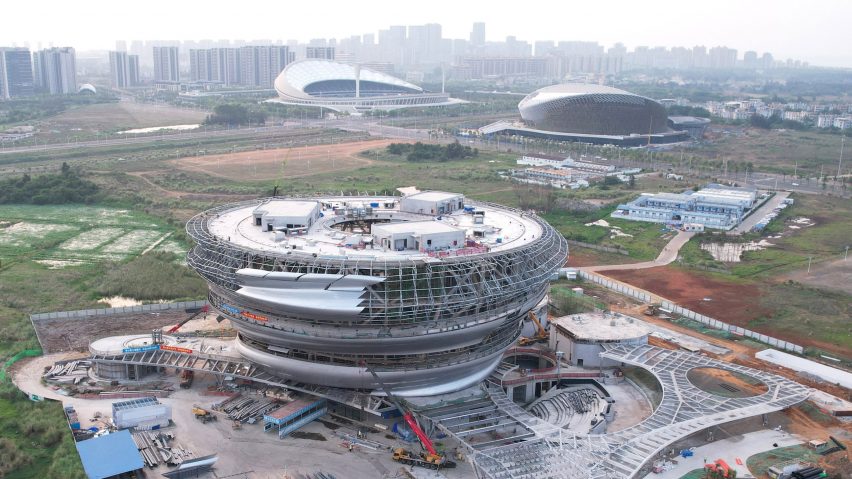Architecture studio MAD has unveiled construction photos of its Hainan Science Museum, as cladding is added to the facade of the "biomorphic" building.
The latest photos show the exterior of the 46,000-square-metre building being covered in silvery fibre-reinforced plastic.
This facade was designed for the tropical climate in Hainan, with open seams and water-guiding grooves to help with drainage.
The curving exterior of the top-heavy Hainan Science Museum is designed to look like an "updraft", according to the studio.
"The science museum features a biomorphic form with fluid, soft shapes, creating a distinctive landmark," MAD said.
"Resembling an updraft, the design mimics the upward movement of warm air from the Earth's surface."
According to the studio, the shape of the six-storey museum is also designed to avoid using unnecessary materials. Its curved facade is directly connected to its core, floor plates and main structure to help create more efficient use of resources.
The circulation and function layout is also integrated with the building structure to reduce waste.
The museum will have five storeys – measuring a total of 28,000 square metres – above ground, with an additional underground level.
MAD designed spaces for younger children on the second and third floors, with older children and adults instead encouraged to experience the museum starting from the top floor.
An interior ramp will ascend throughout the building "like a DNA strand", the studio said. It will be naturally lit by an atrium topped with a glass dome.
Located in China's Hainan province on the west coast of Haikou City, the museum is part of a new district in the area's free-trade port. It will be surrounded by both existing wetlands and new constructions.
MAD aimed for the design of the museum to blend "its natural tropical context with its urban surroundings, where technology and science meet nature".
"A science museum is about education and imagining the future; we want nature to be part of that vision as well," said MAD founder Ma Yansong.
The studio broke ground on the museum in November 2021, with the main structure completed in June of last year. It is expected to open to visitors in 2025, with the curtain wall and landscape construction set to finish by June this year.
Other recent projects by MAD include its first-ever train station and the China Philharmonic Concert Hall in Beijing.
The photography is courtesy of MAD.

